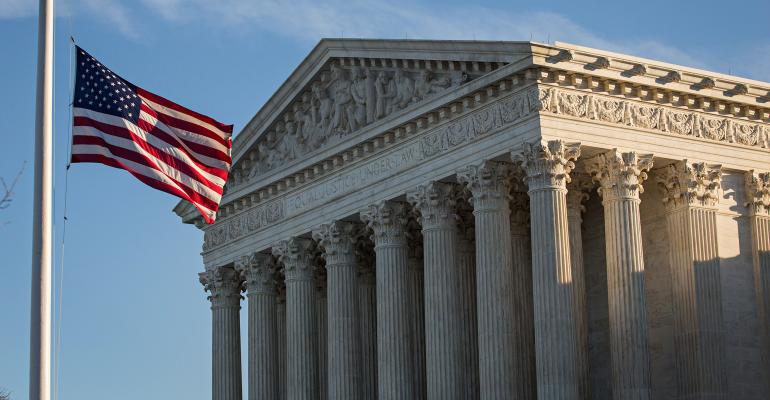
U.S. Supreme Court to Consider Constitutionality of Repatriation Tax
 Drew Angerer/Getty Images News/Getty Images Wealth Planning>High Net Worth U.S. Supreme Court to Consider Constitutionality of Repatriation Tax Moore v. United States involves a challenge to new tax code regarding untaxed foreign earnings.
Drew Angerer/Getty Images News/Getty Images Wealth Planning>High Net Worth U.S. Supreme Court to Consider Constitutionality of Repatriation Tax Moore v. United States involves a challenge to new tax code regarding untaxed foreign earnings. The U.S. Supreme Court will consider the constitutionality of Internal Revenue Code Section 965, which mandated the repatriation tax on previously untaxed income from controlled foreign corporations (CFCs).
Mandatory Repatriation Tax
IRC Section 965 is a relatively new addition to the IRC and was enacted as part of the 2017 Tax Cuts and Jobs Act. Section 965 requires U.S. shareholders to bring the untaxed foreign earnings of certain specified foreign corporations into income and pay a one-time transition tax as if those earnings were then current year Sub-part F income and taxable as income in 2017.
The 8% and or 15.5% effective tax rates applicable to the income inclusions are the result of an applicable participation deduction. Further, a reduced foreign tax credit applies to the inclusion under Section 965(g). Taxpayers could have elected to pay the transition tax in installments over an 8-year period. The Section 965 repatriation tax was projected to generate approximately $340 billion in tax revenue.
Before the enactment of Section 965, U.S. shareholders were only taxed on the earnings and profits of CFCs in two scenarios: if the earnings qualified as Sub-part F income or if the earnings were distributed as dividends. These two scenarios were rare as shareholders could plan around Sub-part F earnings and avoid distributions, so earnings tended to escape current year taxation. Prior to the enactment of Section 965, the U.S. government claimed that more than $2.6 trillion of offshore earnings had escaped U.S. tax.
The Case
Charles and Kathleen Moore, the petitioners, own a 13% stake in an India corporation, KisanKraft Machine Tools Private Limited, which supplies affordable equipment to farmers in impoverished regions of India. Their initial 2005 investment was $40,000.
KisanKraft earned profits each year and reinvested all earnings to grow the business —no funds or other payments/dividends were made to the petitioners. The Moores learned that under Section 965, they would be subject to tax on their share of the reinvested earnings at a 15.5% tax rate—resulting in a tax bill of $14,729. The Moores paid the tax due and then sued for a refund.
In its simplest form, the Moores basis for the refund suit is that the Section 965 repatriation tax is unconstitutional as it’s an unapportioned direct tax that isn’t an income tax. Specifically, the Moores argue that the 16th Amendment doesn’t authorize Congress to tax unrealized sums without apportionment among the states. So, the question at issue is: Does income have to be realized to be taxed?
The District Court disagreed with the petitioners’ assertion and granted the government’s motion to dismiss, holding that the Section 965 transition tax falls within Congress’ power as granted under the 16th Amendment. On Appeal, the U.S. Court of Appeals for the Ninth Circuit affirmed, noting that “realization of income isn’t a constitutional requirement.”
The 16th Amendment - A Bit of History
The official text of the 16th Amendment states, “The Congress shall have power to lay and collect taxes on incomes, from whatever source derived, without apportionment among the several States, and without regard to any census or enumeration.”
This amendment was significant when it was ratified as it reversed the 1895 Supreme Court decision of Pollock that made a nationwide income tax effectively impossible by invoking a distinction between direct and indirect taxes.
At the time, the 16th Amendment was considered a new income tax law and set in motion the federal tax statutes we live by (and sometimes love) today.
Where Do Things Stand?
The Moores’ petition was filed in February, and the government’s response followed in May. Numerous amicus briefs were filed in the intervening months supporting both sides of the argument.
The Supreme Court granted cert on June 26, and arguments haven’t yet been scheduled.
The ruling in this case will be impactful and far-reaching as there are already numerous provisions of the IRC that apply to unrealized gains that haven’t been challenged: Subpart F, global intangible low-taxed income, passive foreign investment company mark-to-market elections, just to name a few!
Is this a slippery slope that would see numerous IRC sections topple and proposed taxes, namely Biden’s Green Book proposal for a tax on unrealized capital gains, fizzle before even taking off? We’ll have to wait and see.
TAGS: Asset Protection 0 comments Hide comments Comment * Switch to plain text editor
Comment * Switch to plain text editorMore information about text formats
Text format CommentsPlain text Comments- Allowed HTML tags: <em> <strong> <blockquote> <br> <p>
- No HTML tags allowed.
- Web page addresses and e-mail addresses turn into links automatically.
- Lines and paragraphs break automatically.
- Load More
- Next Article
- Previous Article
Owl Media Group takes pride in providing social-first platforms which equally benefit and facilitate engagement between businesses and consumers and creating much-needed balance to make conducting business, easier, safer, faster and better. The vision behind every platform in the Owl Media suite is to make lives better and foster a healthy environment in which parties can conduct business efficiently. Facilitating free and fair business relationships is crucial for any thriving economy and Owl Media bridges the gap and open doors for transparent and successful transacting. No advertising funds influence the functionality of our media platforms because we value authenticity and never compromise on quality no matter how lucrative the offers from advertisers may seem.
Originally posted on: https://www.wealthmanagement.com/high-net-worth/us-supreme-court-consider-constitutionality-repatriation-tax